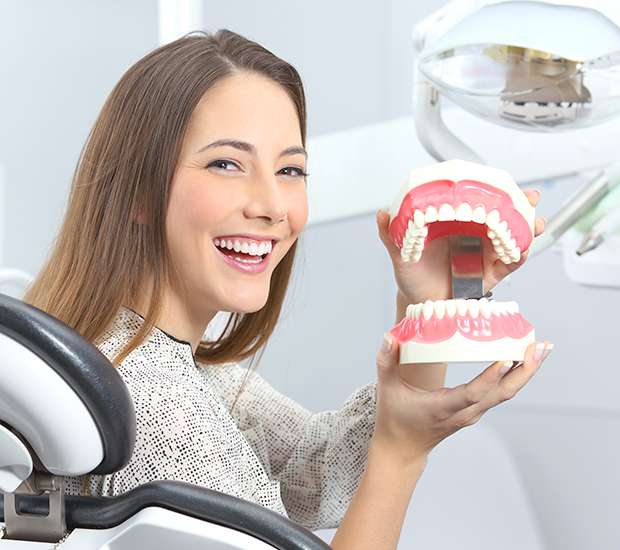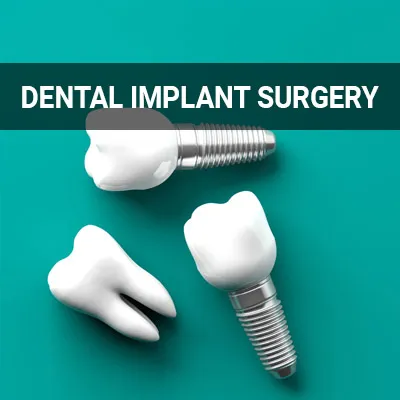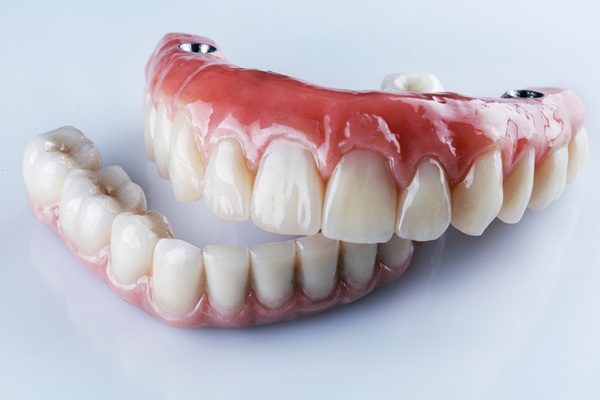Implant Dentist Marietta, GA
When a person loses one or more teeth, implants may prove to be a viable solution. Dental implants are a popular tooth replacement option, as they offer a durable and natural-looking and natural-feeling solution to tooth loss. Not all dentists can place an implant, however. An implant dentist has extensive training, experience, and education in the field of implant surgery and can help to ensure treatment is successful.
An implant dentist is available at Happy Dental and Orthodontics in Marietta and the surrounding area. These professionals are familiar with the complex details of dental implants. They have also received the necessary credentials through the appropriate organizations and demonstrated a commitment to top-quality and individualized care.
Implant dentists possess a strong understanding of all things implant-related and are suited to advise patients of their various treatment options. Work with a professional who is dedicated to putting your smile needs and overall health first. Call us at (770) 200-4034 to schedule a consultation with the doctor today.
The Qualifications of an Implant Dentist
Professionals who refer to themselves as "dental implant authorities" may have received credentialing and training beyond the typical four years of dental school through another organization. Others may practice in one of two specialty areas recognized by the ADA:
- Dental Implant Surgery: A dental implant surgeon is a type of dental professional. They typically possess additional training and experience in oral surgical procedures.
- Oral and Maxillofacial Surgery: Oral and maxillofacial surgeons possess at least four years of post-graduate hospital training. Among other things, said training usually includes comprehensive training in bone grafting and the surgical placement of dental implants.
A general dentist with the appropriate training and experience may also be qualified to place implants. However, generalists may refer patients with more complex needs to implant professionals, typically an oral surgeon or periodontist. A more focused background on implant placement can help handle a wider range of patient issues.
“Those who refer to themselves as “dental implant authorities” may have received credentialing and training beyond the typical four years of dental school through another organization.”
Dental Implants Procedures
Dental implant procedures involve inserting an implant to act as an artificial root, anchoring a custom restorative device. There are two major types of dental implants, endosteal and subperiosteal. Endosteal implants are the most commonly used dental implant and placed in the jawbone. They are usually made of titanium and shaped like small screws.
Subperiosteal implants are implants that we put under the gum but not in the jawbone. This type of implant is best for patients who do not have enough healthy natural jawbone and cannot undergo a procedure to rebuild it. In other cases, we can rebuild the bone through a bone augmentation, a sinus lift, or a ridge expansion to provide a sturdy foundation for an implant.
“Dental implant procedures involve inserting an implant to act as an artificial tooth root, anchoring a dental restoration.”
The Difference Between Dentures and Implants
First and foremost, implants are permanent, whereas removable dentures can be taken out. Dentures sit atop the gum line and should be removed on a nightly basis to avoid irritation to the gums and jawbones. Implants, on the other hand, become part of the mouth. Once the titanium screw has fused to the jawbone, it should function just like a real tooth root and support the artificial tooth for a lifetime.
Implants also provide jawbone and muscle support, whereas dentures do not. Patients who opt for dentures over implants may experience premature aging of the face due to bone density loss. Finally, implants are more comfortable than dentures. Once fully healed, most patients cannot tell the difference between their real teeth and faux ones. Removable dentures require more specialized care and maintenance.
“Implants also provide jawbone and muscle support, whereas dentures do not.”
Check out what others are saying about our dental services on Yelp: Implant Dentist in Marietta, GA
Alternative Options An Implant Dentist Provides
The purpose of dental implants is to provide an artificial replacement for missing or severely damaged teeth. As such, implant dentists can perform other alternative treatments that fulfill the same goal. Alternative treatments will most likely require a tooth replacement option such as a crown.
Alternative implant treatments include, but are not limited to, dentures, bridges, and root canals. Partial dentures are used for patients with one missing tooth, whereas permanent or full dentures are used for those with many missing teeth. Bridges are placed when a patient has several missing teeth in a row. A root canal is performed when the roots of a tooth become infected or otherwise compromised while the tooth remains in good condition.
“Alternative implant treatments include, but are not limited to, dentures, bridges, and root canals.”
Questions Answered on This Page
Q. What dental implants procedures does an implant dentist perform?
Q. What qualifications does an implant dentist have?
Q. What is the difference between dentures and implants?
Q. What alternative options does an implant dentist provide?
Q. When should people seek an implant dentist?
People Also Ask
Q. Who is a good candidate for dental implants?
Q. What should I do if I lose teeth?
Q. What are the implant-supported options to replace teeth?
Q. What does the implant recovery process look like?
Q. What are the benefits of dental implants?
When to Seek an Implant Dentist
In most cases, seeking an implant dentist becomes apparent to both the patient and their primary dentist because of missing or loose teeth. The Mayo Clinic suggests seeking an implant dentist when a patient has one or more missing teeth, a fully grown jawbone, adequate bone to secure the implants to, healthy oral tissue, and more. In other cases, some patients may only need to be a candidate for a bone graft before getting dental implants.
Implants are not recommended for those with health conditions that may affect bone healing. Viable candidates must also be willing to spend several months for the process of implantation and cannot smoke tobacco. If you suspect or have concerns that may require implants, talk to your general dentist as soon as possible to discuss treatment options.
“In most cases, seeking an implant dentist becomes apparent to both the patient and their primary dentist because of missing or loose teeth.”
Frequently Asked Questions
Q. What other options does an implant dentist provide?
A. Though implants are the superior tooth replacement option, an implant dentist understands that many people do not make great candidates for this procedure, whether due to cost, health, or other factors. For those patients, a less invasive method may be ideal. Four additional options include fixed bridges, which use a few implants and a bridge of faux teeth; a resin-retained bridge, which affixes to neighboring teeth; removable partial dentures; and full dentures.
Q. How many teeth can a dental implant replace?
A. While a single implant typically replaces one tooth, implants can also treat the loss of multiple teeth. Multiple implants may suffice. A fixed bridge or implant-supported dentures can also be used to replace multiple or even an entire mouthful of teeth.
Q. What can I expect after an implant dentist performs implant surgery?
A. Following dental implant surgery, a patient may experience some discomfort. Symptoms may include bruising of the gums and skin, swelling, pain at the site of the implant, and minor bleeding. The dentist may prescribe minor pain relievers and antibiotics.
Q. How might an implant dentist advise a patient to care for dental implants?
A. To ensure the longevity of implants, a dentist may advise a patient to follow a few recommended practices. Those include practicing excellent oral hygiene and avoiding teeth-damaging habits, such as chewing on hard items and opening things with one's teeth. The dentist may also recommend more frequent dental visits.
Q. Can an implant dentist guarantee the success of implants?
A. Implants have a very high success rate, but no procedure is 100% effective. Unfortunately, it is impossible to predict certain complications. However, an implant dentist can assess possible risks and take measures to prevent them before beginning surgery.
Dental Terminology
Call Us Today
An implant dentist can help correct issues with missing and damaged teeth. Our team at Happy Dental and Orthodontics can help you achieve the smile you have always wanted. Call us today at (770) 200-4034 to schedule an appointment or learn more about our services.
Helpful Related Links
- American Dental Association (ADA). Glossary of Dental Clinical Terms. 2024
- American Academy of Cosmetic Dentistry® (AACD). Home Page. 2024
- WebMD. WebMD’s Oral Care Guide. 2024
About our business and website security
- Happy Dental and Orthodontics was established in 2021.
- We accept the following payment methods: American Express, Cash, Discover, MasterCard, and Visa
- We serve patients from the following counties: Cobb County and Fulton County
- We serve patients from the following cities: Marietta, Smyrna, Sandy Springs, Atlanta, Kennesaw, Roswell, Acworth, East Cobb, Alpharetta and Fair Oaks
- National Provider Identifier Database (1407403652). View NPI Registry Information
- Norton Safe Web. View Details
- Trend Micro Site Safety Center. View Details
Back to top of Implant Dentist











